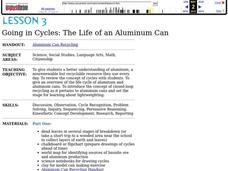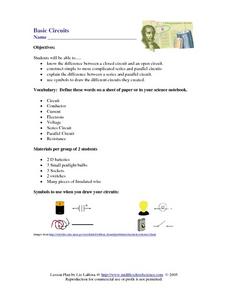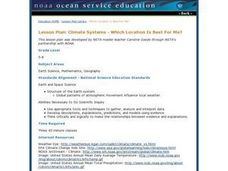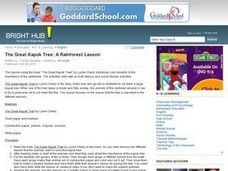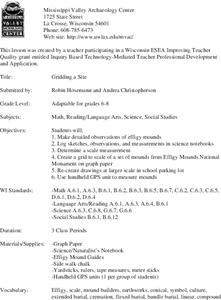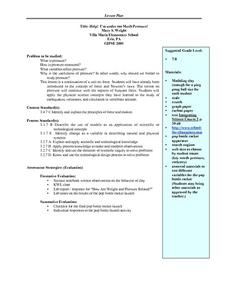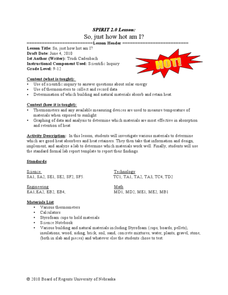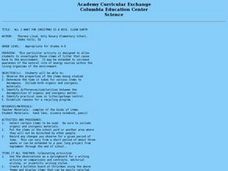Curated OER
Red, Green, and Blue Mystery Liquids! Hypothesis or Inference?
Eighth graders are actively involved in the scientific method and inquiry as they form quick hypotheses based upon a teacher set of mystery liquids. They determine the need to make additional observations of the liquids.
Curated OER
Going in Cycles: The Life of an Aluminum Can
Students investigate the manufacture of aluminum cans and consider the energy and resources saved when the cans are made from recycled material. They explore the concept of closed-loop recycling using charts, worksheets and discussion.
Curated OER
Basic Circuits
Students explain the difference between a closed circuit and an open circuit. They construct simple to more complicated series and parallel circuits. They explain the difference between a series and parallel circuit.
Curated OER
Solving Genetic Puzzles
Seventh graders examine genetics combination using statistics. In this statistics lesson, 7th graders examine genetic trait using a table or punnett square to identify genotype and phenotype. This assignment requires more than one class...
Curated OER
Going in Cycles: The Life of an Aluminum Can
Students explore the life cycle of aluminum cans. In this recycling instructional activity, students review the manufacturing process and how to make a closed loop cycle. Students also have the opportunity to present what they've...
Curated OER
The Day an Egg Solved the Mystery of the Cell
Students conduct an experiment comparing human cells to chicken cells. In this cells lesson plan, students conduct an experiment to see how nutrition moves through cells and how to better take care of their bodies.
Curated OER
Climate Systems - Which Location Is Best For Me?
Students study the difference between weather and climate. In this climate systems lesson students search the Internet for the parts of the Earth's system, gather climate data and complete a challenge scenario.
Curated OER
The Great Kapok Tree: A Rainforest Le
Students explore the rainforest. In this language arts and social studies lesson plan, students discover the importance of the rainforests as they read The Great Kapok Tree and complete an activity.
Curated OER
Gridding a Site
Learners make observations of effigy mounds and record them in a notebook. In groups, they must determine the scale of measurement and create their own grid to scale part of the Effigy Mounds National Monument. They also practice using...
Curated OER
Help! I'm Under Too Much Pressure!
Pupils play with a ping pong ball sized piece of modeling clay observing what happens to the clay as they play with it and write their observations in their notebooks. They share the results of their observations introducing the term...
Curated OER
Testing for Vitamin C in different drinks and foods
Students develop an awareness of the use of Vitamin C in helping our environment and gain exposure to chemical procedures and techniques. Students analyze and interpret data by keeping a data sheet and making a bar graph.
Curated OER
Science: Liquid Matter
Second graders examine the properties of liquids and their classifications. They compare and contrast cups of different liquids and record their findings in journals. Students observe how liquids flow at various speeds and that unlike...
Curated OER
So, just how hot am I?
Young scholars design a lab demonstrating the scientific method. In this earth science lesson, students investigate different materials for their heat absorbing property. They report their findings in class.
Curated OER
Wetlands/Watershed Model
Students make a model that will demonstrate the flow of surface water across the land in Texas and how materials that originate many miles away can end up in the wetland along the coast.
Curated OER
The Formation of Soil
Students identify the different components that make up soil. In this earth science lesson, students create a pamphlet for next year's class. They analyze how erosion and weathering shape the Earth.
Curated OER
All I Want for Christmas is a Nice, Clean Earth
Young scholars observe properties of items, determine time it takes for organic/inorganic items to decompose, identify differences/similarities between decomposition, identify practical uses in litter/garbage control, & establish...
Curated OER
Wetlands/Watershed Model
Students work together to create a watershed model. They discover the flow of surface water on different topography. They examine how materials originate from miles away and end up in a different wetland.
Curated OER
ProjectWILD Aquatic: Migration Headache
Students explore the important factors that affect habitat quality and the associated survival of migratory water bird populations. They discuss an organisms dependency upon a variety of habitats and habitat quality. Students play a game...
Curated OER
How Far Away is SOHO?
Learners create a scale model of the Earth and the sun that demonstrates where the SOHO satellite is in relation to the Earth.
Curated OER
What a Can Can Do
Students explore properties of cans (including aluminum and steel) as they rotate through stations. They experiment with magnets, weight differences, resistance to corrosion and temperature conductivity.
Curated OER
Structures Of Life
Students investigate the basic conceptual structures of plants, with the focus being the parts that contain seeds. They comprehend that organisms that have fruit for the holding of seeds for replication of the species. The students work...
Curated OER
Find Your Peanut
Sixth graders are given a peanut and is asked to study it carefully. They put their peanuts in a bag and they are mixed up. Students are then asked to find their own peanuts. They make careful observations in order to distinguish between...
Other
Science Notebooks
Using science notebooks can be a boon for teachers looking for ways to bolster critical thinking, writing, analysis and scientific knowledge. This site offers examples, answers frequently asked questions and includes resources for teachers.
Science Education Resource Center at Carleton College
Serc: Recording the Weather Around Us Using a Science Notebook in Second Grade
In this investigation, young scholars will observe the weather and use weather terminology to document data in a science notebook. They will continue to observe and record their weather data throughout the year, looking for changes due...



